
How Does Paint Waterproofing Work?
September 5, 2022
Longest Lasting Roof in Singapore
September 19, 2022Top Best Waterproofing Method For Concrete

Top Best Waterproofing Method For Concrete. Concrete is a durable and versatile material, but it’s not impervious to the elements. You will need to apply one of the many waterproofing methods to prevent concrete from getting water damaged. It is applicable in various ways, from pouring cement on top to applying asphalt sealers.
The following are some of the best waterproofing methods for concrete. Read on!
Top Best Waterproofing Method For Concrete
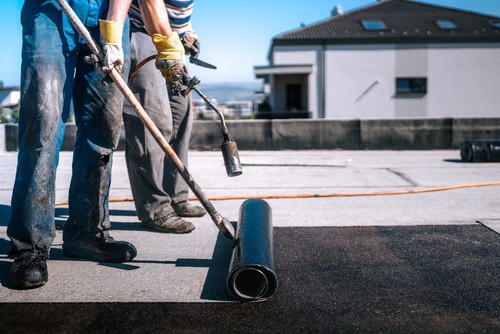
Bituminous coating
Bituminous coating is one of the most popular methods of waterproofing your concrete. This method involves using a bituminous material such as asphalt poured on top of the concrete. This way, no more cracks can form in your concrete floors and walls, which means it’s much more resistant to water damage. With this waterproofing method, your concrete surfaces can last for many years without any problems, even in extreme weather conditions.
Liquid asphalt adhesive
Liquid asphalt is another popular way to waterproof concrete. It runs through the body of water and hardens, acting as a sealant that prevents pores from getting damaged by moisture. It’s suitable in driveways and other areas subject to regular puddling as it can help prevent cracks.
Cementitious coating
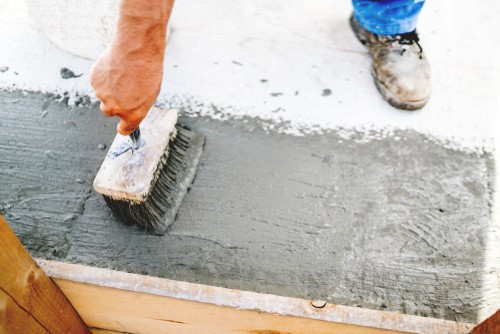
Cementitious coatings are often a mixture of cement and water. They can also include other additives, such as polymerized resin. The combination is applicable on top of the concrete to protect it. One of the best things about this waterproofing method is that it doesn’t require special tools, making it easier to apply.
Cement plaster
Cement plaster can be a bit more challenging to apply than other waterproofing methods. However, it is still not nearly as hard as pouring cement on concrete. It’s suitable on concrete walls, which expose water from roof leaks. Cement plaster creates a solid and durable coating that prevents water from seeping through the pores of the concrete.
Acrylic Coatings
Acrylic coatings are an excellent way for concrete waterproofing floors. Much like cement plaster, it bonds quickly and is applicable even after your concrete floor has dried. Many people use an acrylic coating because it’s much easier to apply than waterproofing methods such as liquid asphalt and cementitious coatings.
Self-Adhesive Systems
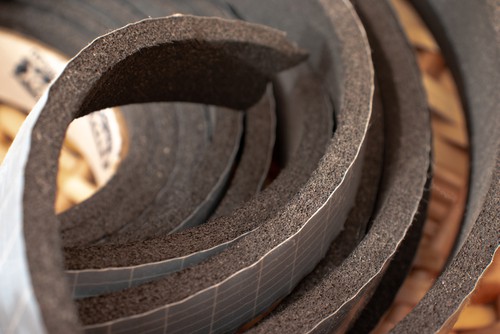
Several self-adhesive resin coatings work great as a waterproofing method for concrete. This is ideal for exterior concrete waterproofing and is an excellent, inexpensive method of protecting a new concrete surface from water damage. It can last up to 3 years and comes in several different textures to match your concrete.
Polyurethane Liquid Membrane
Polyurethane membrane is an excellent waterproofing method that protects concrete from water damage. It works by sealing the pores of the concrete, which prevents water from seeping through your concrete. It’s also a way to protect garage floors when exposed to puddles during rain.
Liquid Applied Membrane
Liquid Applied Membranes are an excellent waterproofing method for exterior concrete. Since it’s applicable right on top of concrete, it can protect your concrete surface from even the worst of weather and water damage. It can last up to 3 years but will require reapplication after those years have passed.
PVC Waterproofing Membrane
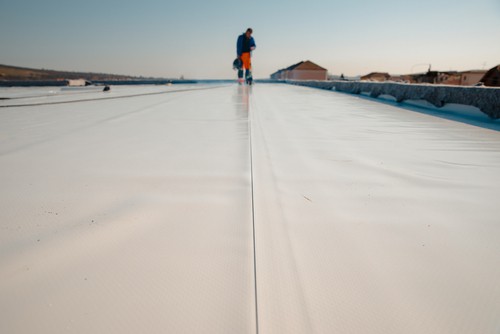
This waterproofing method is incredibly long-lasting, often around 10 years or more. One of the best things about this method is that it applies to exterior concrete and will protect it from water damage. It’s also effortless to use, which makes it an excellent choice for contractors.
Thermoplastic
Thermoplastic waterproofing is another excellent concrete waterproofing method that works well for exterior use. It makes it very durable to resist the elements, which can benefit contractors building homes or business buildings. It can also be applied by using a spray gun to make it much more manageable.
Cementitious Flexible Application
This method is suitable for exterior concrete waterproofing with less exposure to too much water. It works well in preventing the pores of concrete from getting damaged. This way, you can prevent cracks and puddles from forming on your driveway or garage floor. It has a high durability rating with an average lifespan of around 3 or 4 years. This will depend on its use and application.
EPDM Rubber Membrane
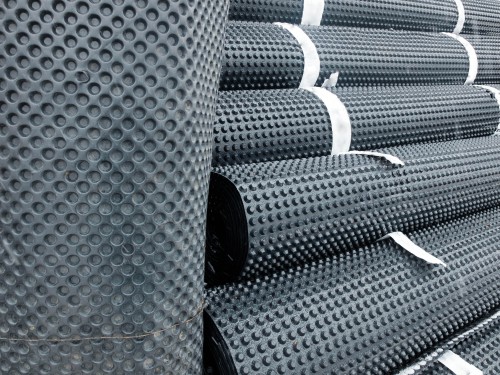
This method makes use of rubber to coat your concrete. Many contractors use this because it’s a great alternative to installing a new surface over your concrete. It also allows for movement, which is ideal for commercial applications where there may be more traffic or moisture.
Bentonite waterproofing
Bentonite is an excellent alternative to cementitious methods of waterproofing. It’s very inexpensive and applies to concrete without needing special tools. Bentonite is very porous and prevents cracks from forming in concrete, which makes it ideal for exterior applications. Many people use this method because the surface feels like a freshly-applied putting green concrete.
Cementitious Rigid Application
Cementitious rigid methods of waterproofing are often easy to apply. They can prevent water from seeping through cracks, allowing concrete to hold up for much longer. It also comes in many different textures to make it blend well with your concrete. It, however, is ideal for interior applications.
Silicone sealant
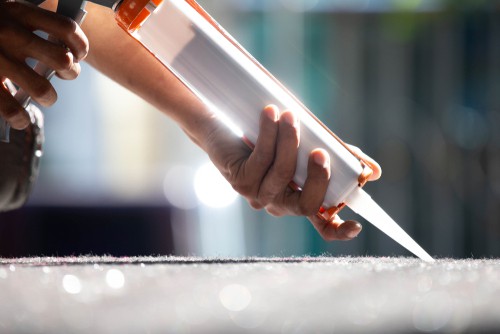
Silicone sealant is an ideal waterproofing method for those getting new with waterproofing projects. It’s effortless to apply and avoid the mess that comes from using other types of waterproofing methods. It works well for interior floors but can only last up to 2 years on exterior concrete before it will need to reapply it.
Crystallized Waterproofing
Waterproofing of concrete surfaces is applicable by crystallization. This process requires spraying nanofibers which act as barriers against water and prevent them from seeping through the concrete pores.
Coated Waterproofing
Coated waterproofing is a method that involves applying liquid chemicals or resin casings on the surface of the concrete. Also, it is applicable to use thermal or tumbling energy to cure, polymerize and bond all the elements in one coating. It ensures that the elements on the surface of concrete are always safe from water damage.
Top Best Waterproofing Method For Concrete – Conclusion
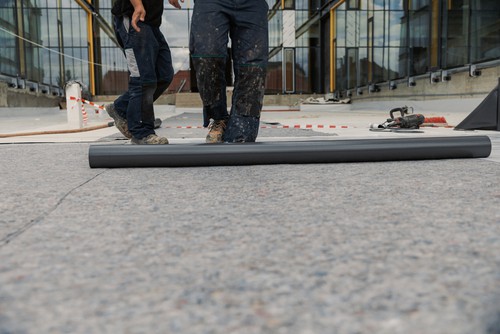
Many professionals highly recommend using waterproofing materials and techniques to protect the surface of the concrete from water damage. Concrete waterproofing is a method that protects buildings from water damage and moisture penetration, which cause structural damage to buildings.

